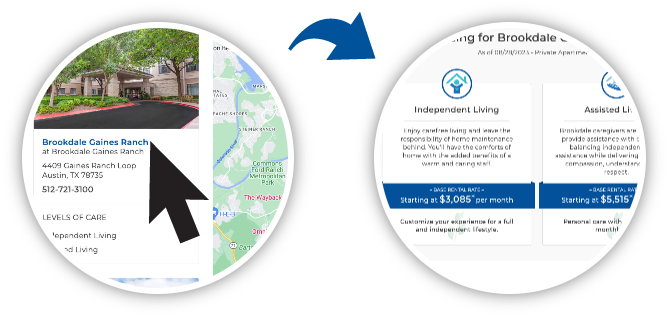- Home
- Brookdale Life
- Brookdale Blogs
- Financial Planners: What Are They, and How Do I Find One?
Determine your financial goals.
Before you start your search for a financial planner, you may first need to determine what kind of planner you might need. It may be helpful to begin by creating a list of your financial objectives. Once you determine your goals, you can better find the right planner who can help you achieve them. For example, if one of your goals is saving up for senior living, you may want to select a financial planner who is experienced in estate planning or retirement planning. There are at least seven areas of financial planning that a financial planner may select as their specialty.
- Cash Management
This type of financial planner may be best suited for a client who typically struggles with sticking to a budget and primarily wants to work on maintaining a positive cash flow. - College Planning
An aspiring student may choose this particular type of financial planner to potentially learn if and how they might become eligible for more financial aid and grants and to possibly save on taxes and interest. - Estate Planning
A financial planner specializing in estate planning may be best suited for someone with multiple financial accounts (e.g., investment accounts, retirement accounts and insurance policies) and who is expecting to make a significant life change, such as a move to long-term care. - Investment Management
A financial planner focusing on investment management may be helpful for someone with a portfolio of securities who may need or want some counsel about what investment strategy makes the most sense to attain their specific financial goals. - Risk Management
A financial planner specializing in risk management may be helpful for someone who owns a cash-positive business. Generally, a financial goal of a person in this position might be avoiding threats to their business cash flow and/or protecting their business cash flow in the instance a threat occurs. Common risks handled by risk management financial planners can include stock market risk, inflation risk, longevity risk, and moral risk as well as risks such as risk of injury, disability, disaster and death. - Retirement Planning
A financial planner concentrating in retirement planning may provide some benefit to anyone who would like to retire! - Tax Planning
Someone who would like to create a plan to potentially help them save on tax payments may be interested in hiring a financial planner focused on taxes.
Locate a financial planner and check their background.
Once you’ve considered the kind(s) of financial planner you may be looking for, you can begin your search. When evaluating whether or not a financial planner is right for you, it is helpful to understand that not all financial planners are made equal. Some are certified financial planners (CFPs). . As “financial planner” is not a regulated term, some financial planners choose to undergo certification while some rely on their own expertise. If you see the acronym CFP in a planner’s title, that means they are a certified financial planner.
In your search, you could also come across professionals calling themselves financial advisors. Financial advisors can also be certified, but certified financial advisors (CFAs) typically work with corporate clients in analyzing their investments. In short, usually a financial advisor may help you to manage your money, accounts and investments, but typically only a financial planner may help you create a plan to reach long-term financial goals.
Whether you opt for a financial planner or a financial advisor, it is often helpful to inquire about their professional background. If they have a credential, you could ask them about it and what it took to obtain it. You may also contact the professional organization that issued the credential in order to verify their status. To see a full list of all financial professional designations, you can use the Financial Industry Regulatory Authority (FINRA)’s Professional Designations glossary, and you may be able to use organization websites to verify credentials. For example, the CFA Institute website allows you to search its member directory to confirm whether a given financial advisor is credentialed, but it does not currently allow you to browse by locale and specialty. Alternatively, the CFP® Board of Standards website allows you to browse credentialed professionals by specialty and geographic area.
The financial planner or advisor having a credential is just one factor for you to consider in evaluating whether a financial planner is trustworthy. You might also want to check their complaint history using the U.S. Securities and Exchange Commission (SEC)’s website, sec.gov; or FINRA, at brokercheck.finra.org.
Discern whether your financial planner is a good fit for you.
Now that you have determined what kind of financial planner you need, located a financial planner, and checked their background, it is likely time for you to speak with the financial planner directly in order to discern whether the person may be a good fit for you. Here are a few questions that you could ask to get you started:
• How will I be charged? Financial planners might charge you hourly, monthly, annually, by the plan, by commission, or by the size of your investment portfolio. The latter is called an assets-under-management fee, and typically it is roughly 1% of the portfolio balance annually.
• What is your client load like? By asking this, you may be able to evaluate how much time your financial planner truly has to spend on you. If you are looking for close, one-on-one management, then a financial planner with a large client load may not be right for you. In that case, it is likely best to try to find a boutique financial planner instead.
• Can you provide any referrals? Although the financial planner’s being certified and having no complaints on their record is generally a good sign, it does not completely tell a financial planner’s full story. To get more information on the quality of services rendered, you can request referrals that you can contact for additional details.
• Is there a minimum income requirement? Some financial planners require that their clients meet a certain income threshold. Many may stipulate that their clients have investable funds at a minimum of $100,000.
If you don’t meet the minimum income requirement for most traditional financial advisors, you likely aren’t out of options yet. Robo-advisors can be a more cost-efficient option for investors with smaller portfolios. The average account size with a digital wealth manager is between $20,000 and $100,000. Alternatively, you may consider using a complimentary custom financial plan like this one offered by Charles Schwab.
Are you ready to reach your financial goals? Read more about money on our Financial Well-Being blog.
All trademarks referenced herein are the property of their respective rights holders.
The above content is shared for educational and informational purposes only. The content is not intended to be a substitute for professional or financial advice and should not be relied upon for making financial or other decisions. Please consult your attorney or financial advisor before acting on any content on this website.
Categories
- Alzheimer's & Dementia
- Caregiver's Corner
- COVID-19
- Health, Safety and Wellness
- Financial Well-Being
- Passion & Purpose
- The Journey to Senior Living
- Trending Now
- Socialization & Relationships
- Brookdale Solutions
- Brookdale Vision and Growth
Archives
View All
- October 2025
- September 2025
- August 2025
- July 2025
- June 2025
- May 2025
- April 2025
- March 2025
- February 2025
- January 2025
- December 2024
- November 2024
X
Let us help find the right community for you!
Complete the form and a Senior Living Advisor will be in touch!
Inside Brookdale Communities
See what’s happening on our community Instagram pages
Brookdale has communities near you!



